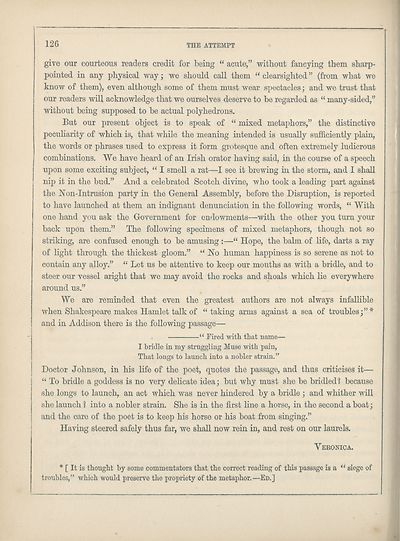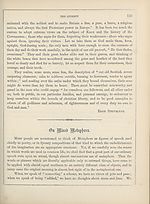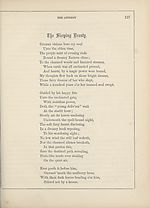Attempt > Volume 1 and Select writings
(138) Page 126
Download files
Complete book:
Individual page:
Thumbnail gallery: Grid view | List view

126
THE ATTEMPT
give our courteous readers credit for being “ acute,” without fancying them sharp-
pointed in any physical way; we should call them “ clearsighted ” (from what we
know of them), even although some of them must wear spectacles; and we trust that
our readers will acknowledge that we ourselves deserve to he regarded as “ many-sided,”
without being supposed to be actual polyhedrons.
But our present object is to speak of “ mixed metaphors,” the distinctive
pecuharity of which is, that while the meaning intended is usually sufficiently plain,
the words or phrases used to express it form grotesque and often extremely ludicrous
combinations. We have heard of an Irish orator having said, in the course of a speech
upon some exciting subject, “ I smell a rat—I see it brewing in the storm, and I shall
nip it in the bud.” And a celebrated Scotch divine, who took a leading part against
the Eon-Intrusion party in the General Assembly, before the Disruption, is reported
to have launched at them an indignant denunciation in the following words, “ With
one hand you ask the Government for endowments—with the other you turn your
back upon them.” The following specimens of mixed metaphors, though not so
striking, are confused enough to be amusing :—“ Hope, the balm of life, darts a ray
of light through the thickest gloom.” “ No human happiness is so serene as not to
contain any alloy.” “ Let us be attentive to keep our mouths as with a bridle, and to
steer our vessel aright that we may avoid the rocks and shoals which lie everywhere
around us.”
We are reminded that even the greatest authors are not always infallible
when Shakespeare makes Hamlet talk of “ taking arms against a sea of troubles;”*
and in Addison there is the following passage—
“ Fired with that name—
I bridle in my struggling Muse with pain,
That longs to launch into a nobler strain.”
Doctor Johnson, in his life of the poet, quotes the passage, and thus criticises it—
“ To bridle a goddess is no very delicate idea; but why must she be bridled? because
she longs to launch, an act which was never hindered by a bridle ; and whither will
she launch ? into a nobler strain. She is in the first line a horse, in the second a boat;
and the care of the poet is to keep his horse or his boat from singing.”
Having steered safely thus far, we shall now rein in, and rest on our laurels.
Veronica.
* [ It is thought by some commentators that the correct reading of this passage is a “ siege of
troubles,” which would preserve the propriety of the metaphor.—Ed.]
THE ATTEMPT
give our courteous readers credit for being “ acute,” without fancying them sharp-
pointed in any physical way; we should call them “ clearsighted ” (from what we
know of them), even although some of them must wear spectacles; and we trust that
our readers will acknowledge that we ourselves deserve to he regarded as “ many-sided,”
without being supposed to be actual polyhedrons.
But our present object is to speak of “ mixed metaphors,” the distinctive
pecuharity of which is, that while the meaning intended is usually sufficiently plain,
the words or phrases used to express it form grotesque and often extremely ludicrous
combinations. We have heard of an Irish orator having said, in the course of a speech
upon some exciting subject, “ I smell a rat—I see it brewing in the storm, and I shall
nip it in the bud.” And a celebrated Scotch divine, who took a leading part against
the Eon-Intrusion party in the General Assembly, before the Disruption, is reported
to have launched at them an indignant denunciation in the following words, “ With
one hand you ask the Government for endowments—with the other you turn your
back upon them.” The following specimens of mixed metaphors, though not so
striking, are confused enough to be amusing :—“ Hope, the balm of life, darts a ray
of light through the thickest gloom.” “ No human happiness is so serene as not to
contain any alloy.” “ Let us be attentive to keep our mouths as with a bridle, and to
steer our vessel aright that we may avoid the rocks and shoals which lie everywhere
around us.”
We are reminded that even the greatest authors are not always infallible
when Shakespeare makes Hamlet talk of “ taking arms against a sea of troubles;”*
and in Addison there is the following passage—
“ Fired with that name—
I bridle in my struggling Muse with pain,
That longs to launch into a nobler strain.”
Doctor Johnson, in his life of the poet, quotes the passage, and thus criticises it—
“ To bridle a goddess is no very delicate idea; but why must she be bridled? because
she longs to launch, an act which was never hindered by a bridle ; and whither will
she launch ? into a nobler strain. She is in the first line a horse, in the second a boat;
and the care of the poet is to keep his horse or his boat from singing.”
Having steered safely thus far, we shall now rein in, and rest on our laurels.
Veronica.
* [ It is thought by some commentators that the correct reading of this passage is a “ siege of
troubles,” which would preserve the propriety of the metaphor.—Ed.]
Set display mode to: Large image | Transcription
Images and transcriptions on this page, including medium image downloads, may be used under the Creative Commons Attribution 4.0 International Licence unless otherwise stated. ![]()
| Ladies' Edinburgh Debating Society publications > Attempt > Volume 1 and Select writings > (138) Page 126 |
|---|
| Permanent URL | https://digital.nls.uk/109866610 |
|---|
| Attribution and copyright: |
|
|---|

